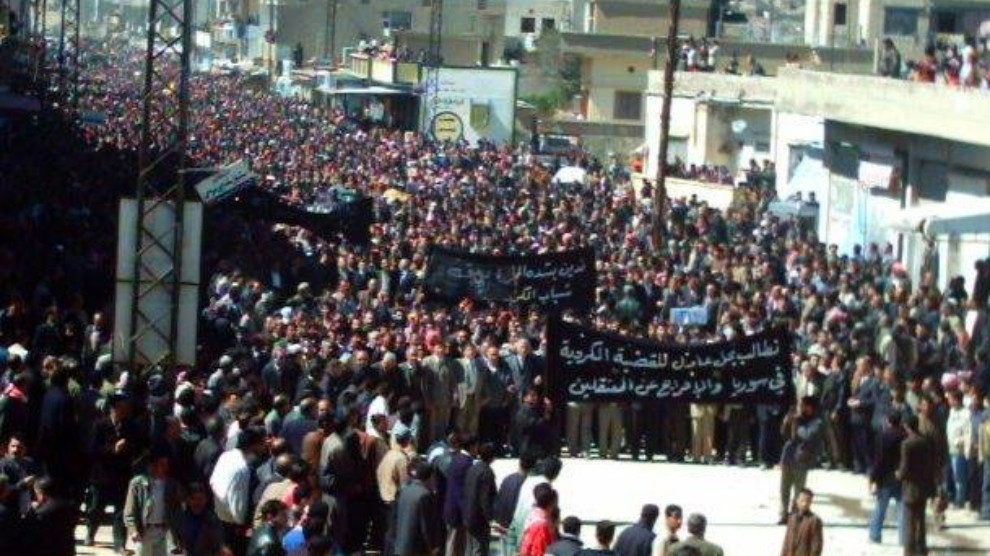TEV-DEM commends 2004 Qamishlo uprising
TEV-DEM commended the Kurdish people for the gains that have achieved since the Qamishlo uprising in 2004 and emphasized that the solution is the Autonomous Administration project.
TEV-DEM commended the Kurdish people for the gains that have achieved since the Qamishlo uprising in 2004 and emphasized that the solution is the Autonomous Administration project.

The Democratic Society Movement (TEV-DEM) issued a written statement on the occasion of the anniversary of the Qamishlo uprising (Serhildana Qamişlo) in 2004.
TEV-DEM said: "We bow with respect in memory of all our martyrs in the anniversary of the Qamishlo uprising.
The Baath regime and a chauvinist group have put in place conspiracies against the Kurdish people and aimed to destroy their Kurdish identity in Syria. Those who are pursuing this aim have also aimed to plant seeds of sedition between the Kurdish people and the Arab people.
However, the plot failed and in fact turned into a revolt against the Baath regime and these chauvinist sections. The people who rebelled with their own power forced the Syrian state administration to accept the Kurdish people as a basic component of Syria.
The 2004 uprising has drawn a line
With the uprising, which began on 12 March 2004, a line was drawn in the wild system of the Syrian Baath regime, and thanks to the people's resistance and the sacrifice of the martyrs, the uprising spread to all the places where the Kurds lived.
This uprising also exposed the backstage of the Adana Agreement, which was reached under the influence of the Turkish system.
Based on this agreement, laws were enacted and detention and arrests against our people were developed recklessly under these laws. Again, Emni Dewle (state security courts) rulings were pronounced in this way.
However, despite all these attacks and practices, our people did not submit to any pressure, and continued to struggle knowing that they will obtain their rights. The people, who started to organize, carried out democratic and peaceful protests."
The Syrian state did not listen to the calls for democratization
The statement continued: "Syria, which did not take into account the calls for democratization of the peoples, leading to a great internal crisis which has been going on for 9 years. In addition to major destruction, death and migration have occurred. Syria has faced disintegration in the past 9 years. This crisis still continues. Syrian President Bashar al-Assad, who claims that the Kurds are not Syrians, will not be able to break the will and unity of the peoples from now on, and those who try to create division among the people will not reach their goals.
The Syrian state administration remained silent against the occupation of its territory by the Turkish state. The Syrian state rejects the Autonomous Administration built by the peoples. This means ignoring the will of a people who defend the territorial integrity of Syria and fight against terrorism.
Such statements that do not serve the solution of the Syrian crisis and will only deepen the current crisis. Such statements, which do not mean anything but to create new contradictions, also block the way for a democratic solution.
The solution is the Autonomous Administration project
The solution lies in correct and principled politics. For this, the Autonomous Administration project, which recognizes the rights of all peoples, is the most appropriate solution model.
It should be clearly known that it would not be a solution to reject the free will of the peoples who defeated terrorism."
Background: the 2004 uprising
Nine people were killed on 12 March 2004 when clashes erupted at a football match in the Kurdish-majority city of Qamishlo between supporters of a local team and those of an Arab team based in Deir Ezzor.
The following day, mourners at the funeral procession for the victims chanted anti-Bashar al-Assad slogans and raised Kurdish flags.
Syrian security forces opened fire, killing 23 people and sparking days of protests and rioting in northern Syria’s Kurdish regions (Al-Hasakah, Kobani, Afrin) as well as Kurdish-majority neighborhoods of Aleppo and Damascus.
The revolts were crashed by al-Assad forces but the Syrian regime was forced to recognize Kurds.